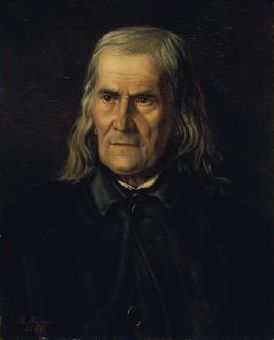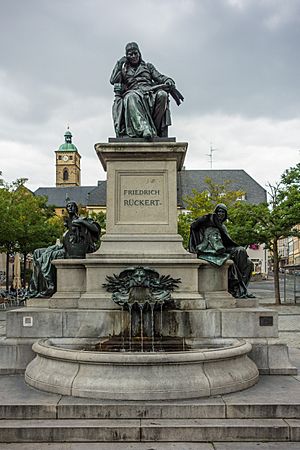Friedrich Rückert facts for kids
Quick facts for kids
Johann Michael Friedrich Rückert
|
|
|---|---|

Rückert portrait by Bertha Froriep (1864)
|
|
| Born | 16 May 1788 Schweinfurt, Holy Roman Empire |
| Died | 31 January 1866 (aged 77) Neuseß, Coburg, Saxe-Coburg and Gotha, German Confederation |
| Resting place | Neuseß, Coburg |
| Occupation | Professor of Oriental languages |
| Language | German |
| Nationality | German |
| Education | University of Würzburg, Heidelberg University |
| Genre | German poems in the spirit of Oriental masters |
| Years active | 1814–1866 |
| Notable works | Die Weisheit des Brahmanen (The Wisdom of the Brahmins) and Liebesfrühling (Spring of Love) |
| Spouse | Luise Wiethaus-Fischer |
Johann Michael Friedrich Rückert (born May 16, 1788 – died January 31, 1866) was a famous German poet, a skilled translator, and a professor. He taught about languages from the East, which are often called Oriental languages. He wrote many poems and translated important works from other cultures.
Contents
About Friedrich Rückert
His Early Life and Education
Friedrich Rückert was born on May 16, 1788, in a town called Schweinfurt in Germany. He was the oldest son of a lawyer, Johann Adam Rückert. Friedrich went to school at the local Gymnasium. This is a type of high school in Germany. Later, he studied at the Universities of Würzburg and Heidelberg.
His Career and Family Life
From 1816 to 1817, Friedrich worked for a newspaper called Morgenblatt in Stuttgart. In 1818, he spent almost a whole year in Rome, Italy. After that, he lived in Coburg for several years, from 1820 to 1826. In 1821, he married Luise Wiethaus-Fischer in Coburg.
In 1826, he became a professor of Oriental languages at the University of Erlangen. These are languages from places like the Middle East and Asia. Then, in 1841, he moved to Berlin for a similar job. He was also given a special title there. In 1849, he decided to leave his teaching job in Berlin. He moved to his country estate in Neuses, which is now part of Coburg, and lived there full-time.
His First Poems and Writings
When Friedrich Rückert started writing, Germany was going through a tough time. They were fighting against Napoleon. In his first book, Deutsche Gedichte (German Poems), published in 1814, he used a pen name: Freimund Raimar. In this book, especially in poems like Geharnischte Sonette (Sonnets in Arms), he showed the strong feelings of his country.
Between 1815 and 1818, he wrote a play called Napoleon, eine politische Komödie in drei Stücken (Napoleon, a Political Comedy in Three Parts). Only two parts of it were published. In 1817, he released Der Kranz der Zeit (The Wreath of Time).
His Famous Collections and Translations
In 1822, he published a collection of poems called Östliche Rosen (Eastern Roses). From 1834 to 1838, his Gesammelte Gedichte (Collected Poems) came out in six volumes. This collection has been printed many times.
Rückert was amazing because he knew thirty different languages! He became very well known for translating poetry from Eastern cultures. He also wrote poems that felt like they were written by Eastern masters. Some of his famous translations include:
- Hariris Makamen (1826), a translation of an Arabic work.
- Nal und Damajanti (1828), an Indian story.
- Rostem und Suhrab, eine Heldengeschichte (Rostem and Suhrab, a Story of Heroes) (1830).
- Hamasa, oder die ältesten arabischen Volkslieder (Hamasa, or the Oldest Arabian Folk Songs) (1846).
He also wrote his own original works about Eastern subjects, such as:
- Morgenländische Sagen und Geschichten (Oriental Myths and Poems) (1837)
- Erbauliches und Beschauliches aus dem Morgenland (Edifying and Contemplative, from the Orient) (1836–1838)
- Brahmanische Erzählungen (Brahmin Stories) (1839).
His most detailed work is Die Weisheit des Brahmanen (The Wisdom of the Brahmins). It was published in six volumes from 1836 to 1839. This work and Liebesfrühling (Spring of Love) (1844), which is a collection of love songs, are his most famous creations.
From 1843 to 1845, he wrote several plays. These include Saul und David (1843), Herodes der Große ("Herod the Great") (1844), Kaiser Heinrich IV (1845), and Christofero Colombo (1845). While these plays are not as famous as his poetry, they show his wide range of interests. In 1864, during a war, he wrote Ein Dutzend Kampflieder für Schleswig-Holstein (A Dozen Battle Songs for Schleswig-Holstein). These songs were published without his name but made a big impact.
His Legacy and Influence
Friedrich Rückert passed away in 1866 in Neuses, which is now part of Coburg. He is buried in the cemetery there. His work still greatly influences people who study Eastern cultures in Germany today.
Many composers were inspired by Rückert's poetry. About 121 of his poems have been set to music. This is a huge number, placing him behind only a few other famous poets like Goethe and Heine. Some of the famous composers who used his poems for their music include Schubert, Robert and Clara Schumann, Brahms, and Mahler. Mahler even created two song cycles, Kindertotenlieder and Rückert-Lieder, based on Rückert's poems.
Memorials to Friedrich Rückert
There is a monument dedicated to Friedrich Rückert in the Marktplatz (market square) in Schweinfurt. This monument has been in the main square since 1890. It was designed by architect Friedrich Ritter von Thiersch and sculptor Wilhelm von Rühmann. At the base of the bronze statue of Rückert, there are figures from his works. These include figures from Geharnischte Sonette ("Withering Sonnets") and Weisheit des Brahmanen ("Wisdom of the Brahmans").
You can also visit a small museum in his former home in Neuses. This museum is located on Friedrich-Rückert-Strasse. There is also a park called Rückertpark which has a special bust (a sculpture of his head and shoulders) to remember him. The museum in Friedrich-Rückert-Strasse has over 1,000 dolls, including one that is said to be the grandmother of the famous "Barbie" doll.
In 1847, Rückert also translated some verses from the Tirukkural, an ancient classic text from the Tamil culture, into German.
Images for kids
Error: no page names specified (help). In Spanish: Friedrich Rückert para niños
In Spanish: Friedrich Rückert para niños
 | Roy Wilkins |
 | John Lewis |
 | Linda Carol Brown |




